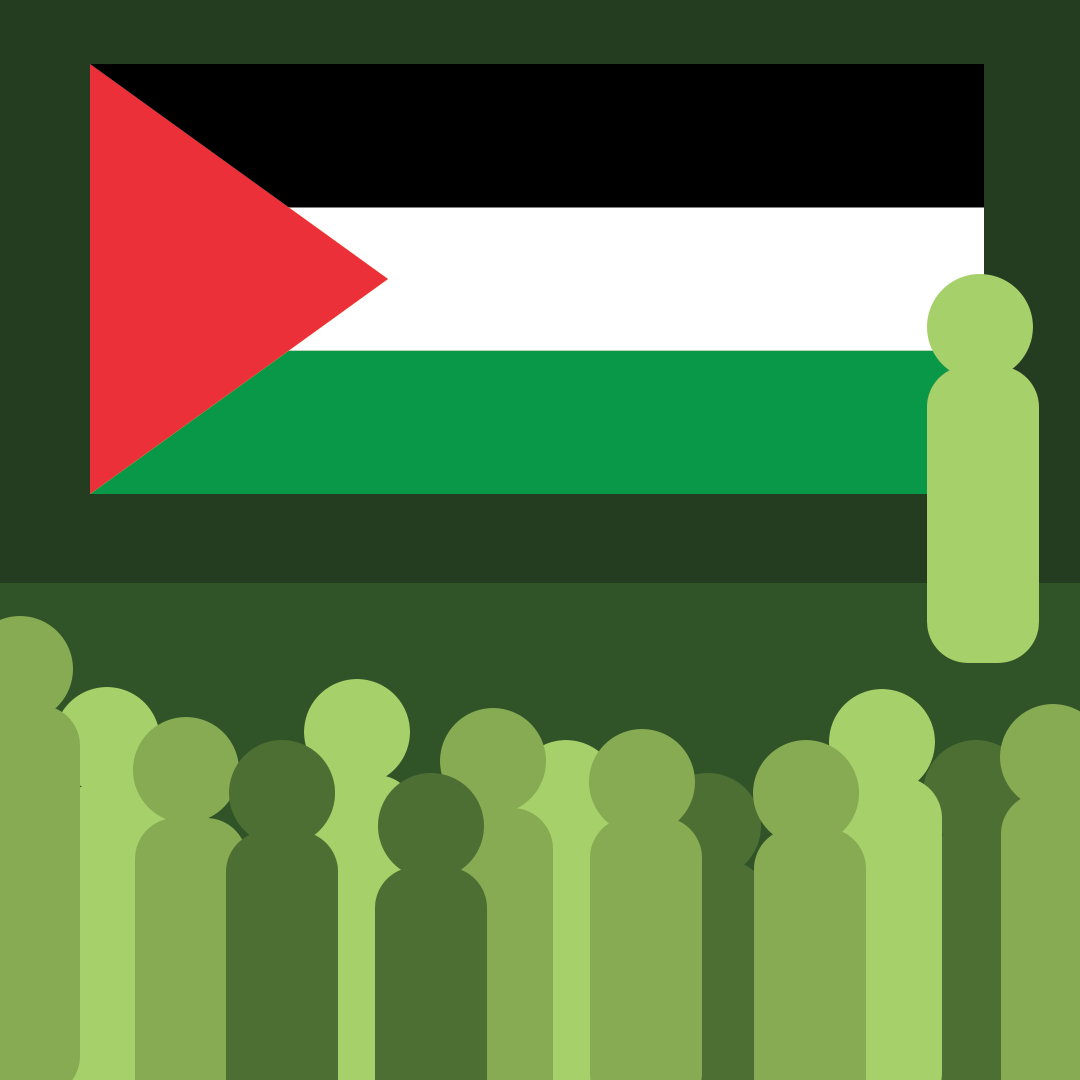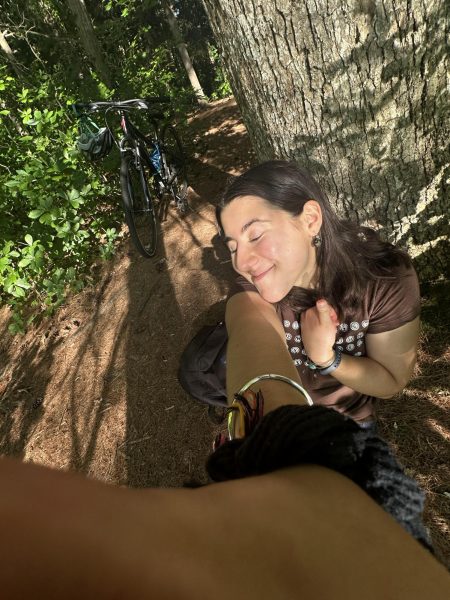This fall semester, 40 students and one faculty member packed into a sociology classroom to take a course that was originally meant to be half that size. On Wednesday, Sept. 4, with a double-digit waitlist and every seat filled, Macalester sociology professor Khaldoun Samman welcomed students to his course entitled “Palestine.” For students, the start of this class promised the beginning of a deep engagement with critical and difficult material, which is exactly what motivated many to claim a spot and push the class to its capacity.
“I was initially a little worried,” Samman reflected, “for obvious reasons, that this could become a course that could lead to some tensions and unhealthy discussions and people feeling like they’re being chastised or or marginalized, and others that might get upset because I didn’t handle something properly. It’s been a wonderful experience.”
The class on Palestine bridges comprehensive discussion with a deep study of literature. The format of each session, as a three-hour-long weekly meeting, has allowed for both in-depth explorations of the readings and thoughtful visits from guest speakers. Since the opening sessions of the course, the enthusiasm of the students and their deep engagement with the material has made the planning of the course smooth and rewarding for Samman.
“I wanted us to kind of ground ourselves in [the topic] before we brought in the speakers, so we read, [for example,] Rashid Khalidi — little sections from his book ‘100-year war on Palestine,’” Samman reflected. “Students have been really excited and coming in motivated. … The enthusiasm is huge.”
Each class session typically involves discussion of the topics and readings assigned, and can then move into small group discussions, during which Samman emphasizes the importance of mixing up groups to hear different perspectives and engage thoughtfully with each other’s points of view.
“It’s such an easy class to teach, because you ask a question and 10 hands go up, you know?” Samman laughed. “And so that’s been wonderful. And people are listening to each other, which is really nice. I don’t know everyone’s political affiliation, I don’t want to claim that everyone is on board with this kind of analysis, but I know that people are open to at least learning about that perspective, and that’s been really good.”
That initial caution surrounding discussion of the material in the class is common in academia today, as school communities continue to grapple with how to approach the topic of Palestine in and out the classroom. Tensions within the United States’ institutions surrounding the appropriate way to respond to the global crisis have left many professors motivated to both provide space for discussion and leave their students feeling better equipped to imagine and brainstorm possibilities for the future. For this semester’s class, the final discussions in the coming weeks are meant to do just that.
“Students are like, ‘okay, so is there anything that can be done?’” Samman said. “So we’re gonna be reading things people have written on ‘Palesreal,’ like, [are] there ways to reassemble one-state solution versus two-state solution? What that looks like, some of the complexities of trying to go down these roads … so they’ll be studying that, and I’m gonna have them work in groups and come up with their thoughts on these different possible resolutions.”
For several members of the class, Samman’s teaching has accomplished his goal of opening their eyes to historical perspectives and narratives and leading them to focus deeply on the layered history of Palestine.
“Taking this class really changed the way I thought about Palestine,” Ava Van Brunt ’28 shared in a text message to The Mac Weekly. “It can be hard to read about, but it is necessary to understand if you want to see the full picture.”
Aicha Dione ’26 shared a similar sentiment, noting that her favorite reading for the class was written by Samman himself. “It opened my eyes to all of the factors that play into this war,” she wrote in a text message to The Mac Weekly. “This class has been so insightful, I cannot recommend it enough!”
At the same time, for some students, there are tensions around discussing ongoing violence in abstract, theoretical terms and a push and pull between taking an academic and an activist lens more generally.
“Learning to learn is a valuable thing, but what do we do with that information?” OSB ’26, a Mac for Palestine organizer and student in the class, said. “If everyone just learns about Palestine [and] no one does anything, that’s inadequate — extremely inadequate, devastatingly inadequate. There must be more.”
OSB often advertises Mac for Palestine events and recruits for the group itself, and many of their classmates, looking for an outlet for the emotions they feel in class, have gotten involved.
“People learn about … one of the most oppressed groups in the world having one of the most horrific things that’s possible to happen to them,” OSB said. “All of that anger and sadness and frustration and grief [they’re feeling], all of those things can be then channeled into action. And that’s very much happened with a lot of people in that class.”
The class has also helped Mac for Palestine members build a shared understanding of the history of Palestine and Israel, connect with other organizers when they visit the class as guest speakers and conduct a “temperature check” on the campus to better understand the perspective of students who care about Palestine but don’t have the capacity to be highly engaged in movement work.
In a political climate in which students, staff and faculty at other universities have faced intense consequences for pro-Palestine activism, OSB feels grateful for the opportunity to take this class.
“This is not a class that could be taught … at so many other colleges and universities,” OSB said. “I think Khaldoun was extremely brave for pushing to teach this class here. Another reason [that] I wanted to take this class is because … I feel a duty to take advantage of the privilege that I have as a Mac student.”
Samman’s class has been one of the most attended courses of this fall semester at Macalester. The professor has hosted six guest speakers, facilitated weekly discussions on high-level texts and analyses and, most significantly, taught in a way that has grown past the classroom and into the individual lives and perspectives of its members. Samman’s “Palestine” has done much more than just teach history — it has equipped dozens of Macalester students with knowledge, analytical skills and the ability to discuss and convert their feelings and thoughts into movement. For many students, this continues to be a highly relevant part of their academic experience as community members continue to organize and mobilize for Palestine.








